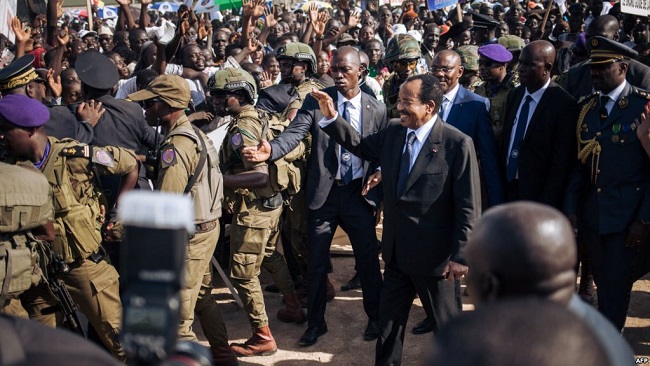French Cameroun Counterfeit Presidential Election: Biya still frontrunner despite crises
More than 6.5 million Cameroonians will elect their next head of state this week but Paul Biya, president for 35 years, remains the front-runner despite a raging anglophone insurgency and jihadist threats. The central African nation of 25 million people has never staged polls amid insecurity so serious that the military is currently deployed to three of ten regions.
In the far north, soldiers are tackling the Nigeria-based jihadist group Boko Haram, while in the two anglophone regions its mission is to suppress a nascent secessionist insurgency. The separatists have threatened to disrupt voting in the areas where they operate, prompting security forces to fan out across those regions ahead of Sunday’s presidential election.
Yaounde has been adamant that polling will go ahead across the whole country, according to a minister, while Biya has downplayed the conflicts are mere “trouble”.
Violence in the English-speaking regions has flared since the beginning of the crisis at the end of 2016 while security forces have responded to protest action with heavy handed tactics and waves of arrests.
The unrest has killed more than 400 people this year, according to the International Crisis Group think-tank, and there has been an exodus from these regions ahead of the vote.
What began as a limited movement calling for greater economic opportunities and recognition of the English language quickly snowballed into a deadly fight between Cameroon’s military and heavily-armed separatists.
Attacks on symbols of Cameroonian authority including police killings and kidnappings of civil servants have mounted while some local officials have fled anglophone areas, fearing for their lives.
‘The force of experience’
Officials at the Elecam electoral commission have said that some polling stations will be “relocated” to ensure the integrity of the vote.
Despite the challenges facing the nation, Biya has drawn upon a vast network of support to ensure the ubiquity of his campaign.
Towns across the country are dotted with billboards emblazoned with Biya’s face, proclaiming him to be the “force of experience”.
At his first and so far only campaign stop, in Maroua in the far north at the weekend, Biya was feted by ministers, party flunkies and traditional leaders. His supporters appear on television daily to proclaim his accomplishments and to defend his record.
Biya’s vision for Cameroon, first published in book form in 1987, was reissued in September in time for the polls. Biya, who typically keeps a low profile, said at the Maroua campaign meeting that he would use “a firm hand and dialogue” to resolve the crisis in the anglophone region.
Eight opposition candidates will face off against Biya on Sunday – but all will confront an uphill struggle with at least one candidate accusing the incumbent of having an unfair advantage.
Unlike the three previous elections where veteran opposition chief Ni John Fru Ndi stood, the field of opposing candidates this year is wide open.
Dislodge ‘the Sphinx’
“It’s the first time in Cameroon’s history that there are opposition candidates with such clearly differentiated, truly different policies,” said Fred Eboko, a Cameroonian analyst at the French Research Institute for Development (IRD).
The candidate for the main opposition Social Democratic Front (SDF) party Joshua Osih is the contender carrying the torch for Ndi. Maurice Kamto is the insurgent candidate who has never before sought elected office and could benefit if the SDF struggles to mobilise its largely anglophone base in the conflict torn English-speaking regions.
Akere Muna, a renowned lawyer, benefits from strong overseas contacts and could benefit from protest votes cast against his better-known rivals.
No opposition coalition emerged ahead of campaigning for Sunday’s polls meaning that each of the eight challengers to Biya’s 35-year rule will have a herculean task to secure the numbers required to dislodge the leader known as “the Sphinx”.
As in 2011, an opposition upset victory looks highly unlikely. In that vote, Biya won 77.98% with both Washington and Paris warning that there were “numerous irregularities” in the conduct of the polls. The opposition, the Catholic church and a number of action groups have said they will deploy observers to deter and detect vote fraud.
Whoever wins at the ballot box, the victor will face immense challenges. Just 10% of working age people are in formal employment, one-third of Cameroonians live on less than $2.30 a day, and three in four people have only known Biya as their leader.
Source: News 24





